In this week’s review of Court Judgments, we look at the Supreme court’s observations about the role of the state as a trustee of natural resources, why a change in Government Policy would prevail over individual interests if it is reasonable and in the public interest, that orders passed by the constitutional courts would prevail over the orders passed by the statutory tribunal, and Karnataka HC’s judgment about compounding and termination of proceedings for rape offences if settlement is arrived by the parties.
Supreme Court: Public Trust Doctrine Part of Law of Land; Role of the state as trustee of natural resources more relevant today
In multiple applications filed under TN Godavarman Thirumalpad vs. Union of India, the Supreme Court of India held that the role of the state should not be limited to that of a facilitator for economic activities, instead, it should act as a trustee of natural resources for the overall sustainable development.
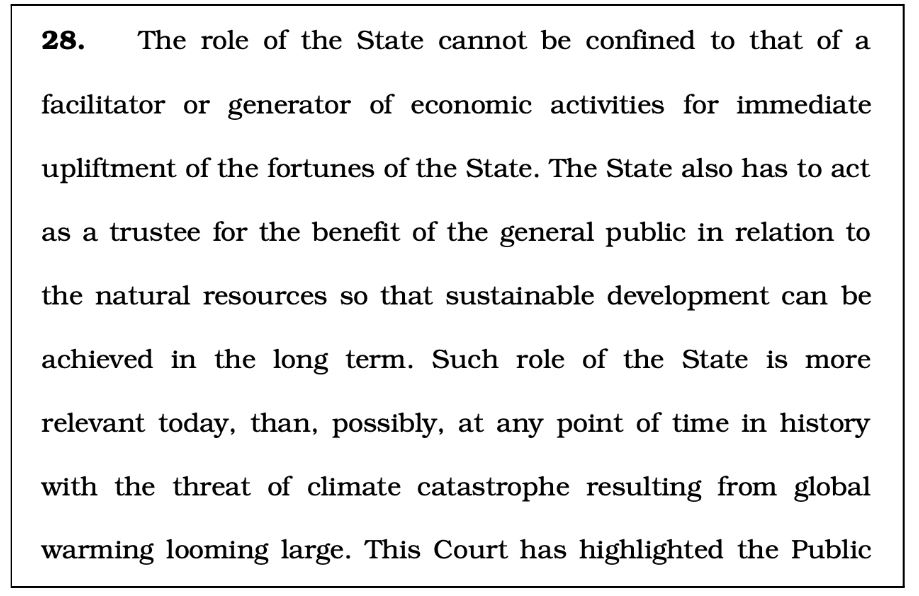
The apex court, headed by Justices L Nageswara Rao, BR Gavai and Aniruddha Bose, was hearing a batch of petitions filed under the TN Godavarman Thirumalpad vs. Union of India case. While it was initially instituted for the protection of natural resources in Tamil Nadu, its scope was widened to be applicable to the whole of India. Accordingly, a Central Empowered Committee (CEC), a statutory body formed under the Section 3(3) of the Environment Protection Act, 1986 was entrusted with the responsibility to check measures for encroachment removal, compensatory afforestation and similar other conservation measures. The present order dealt with two issues:
- Regarding mining activities in Jamwa Ramgarh wildlife sanctuary in Rajasthan
- Specifying the limits of Eco-sensitive zones around national parks and wildlife sanctuaries.
In the first issue, the court was examining a report submitted by the CEC on the Jamwa Ramgarh wildlife sanctuary. The report observed that forests under this sanctuary are destroyed and recommended that all mining leases should be cancelled, irrespective of their proportion under the forest area. It also talks about the inadequacy of the present safety zone of twenty-five meters and recommends it to raise to 100 meters for existing mines and 500 metres for new mines.
Regarding the second aspect, the apex court held that a minimum of one-kilometre width of an Eco-sensitive zone (ESZ) must be maintained for all national parks and wildlife sanctuaries. Jamwa Ramgarh wildlife sanctuary would be 500 metres for existing activities. Additionally, if any local law prescribes more than one kilometre limit of ESZ, it shall prevail over this. The responsibility to ensure compliance with the above guidelines is on the Principal Chief Conservator of Forests, and the Home Secretaries of both State and Union Governments. The dilution of this minimum ESZ limit is allowed in cases of overwhelming public interests, provided the apex court issued directions based on the recommendations of CEC and the Ministry of Environment, Forests and Climate Change. The apex court clearly asserts that mining shall not be allowed in wildlife sanctuaries and national parks.
Supreme Court: Change in Government Policy would prevail over individual interests if it is reasonable and in the public interest.
The Supreme Court in Yamuna Expressway Industrial Development Authority Etc. vs. Shakuntla Education and Welfare Society and Ors reiterated that a change in government’s stance and policy shall prevail over private agreements between government and private players, provided such change is guided by reason and is done in the public interest.
The apex court was hearing an appeal petition filed by the State of Uttar Pradesh against the Allahabad High Court’s decision to set aside the policy decision of the State Government to collect an additional premium from the initial allottees of the Yamuna Expressway Industrial Development Authority (YEIDA) -developed plots.
The SC looked at Savitri Devi vs. State of Uttar Pradesh, and Gajraj and others vs. State of U.P. and others, to analyse the appeal by the Uttar Pradesh Government. In the above two cases, the High Court and Supreme Court upheld the decision to pay additional compensation of 64.7% by the State for land acquisition in the New Okhla Industrial Development Authority (NOIDA) development. The same was applied for YEIDA land acquisition also, and the state government and board of YEIDA approved the same amount as ‘no litigation incentive’ or additional compensation for land acquisition. However, in the current case of YEIDA, notices were sent to the allottees demanding an additional premium of Rs. 600 per square metre.
The apex court observed that more than 98% of the landowners do not have any objection to paying the additional premium, and the policy of the State Government to increase the premium amounts is in the larger interests of the public. It held that the High Court made an error in interfering with the policy decision of the State Government. Accordingly, the apex court allowed the appeals by the State Government against the High Court’s decision.
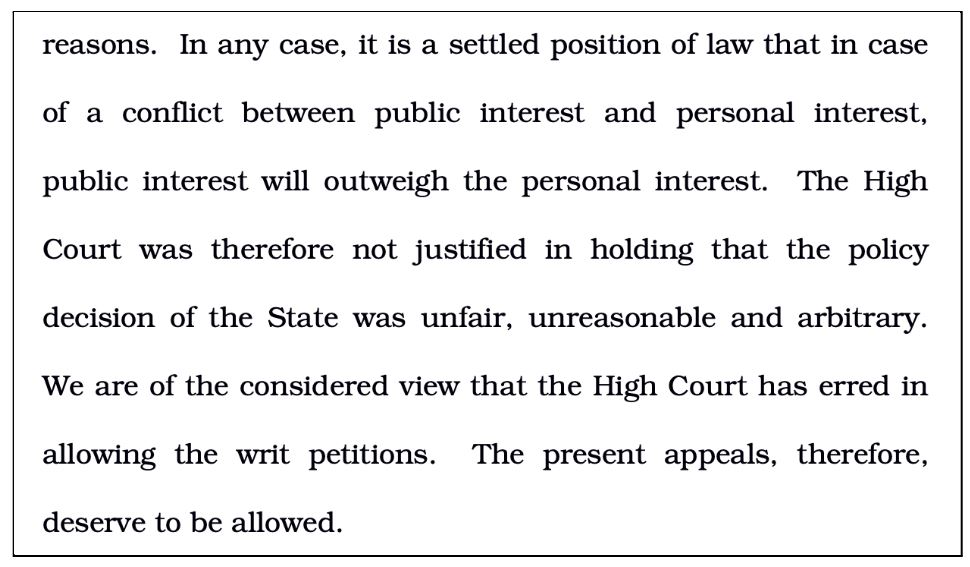
Supreme Court: It is the orders passed by the constitutional courts, which would be prevailing over the orders passed by the statutory tribunals.
In State of Andhra Pradesh vs. Raghu Ramakrishna Raju Kanumuru (M.P), the Supreme Court of India held that tribunals would be subordinate to the High Courts insofar as the territorial jurisdiction of the High courts is concerned, and that it is the orders of the Constitutional Courts that prevail over the orders issued by the statutory tribunals.
The apex court was hearing an appeal petition by the State of Andhra Pradesh, against the order passed by the principal bench of the National Green Tribunal (NGT) on 06 May 2022. The appellant, State of Andhra Pradesh, was running a resort at Rushikonda Hill, Vishakhapatnam. They demolished the existing one and are reconstructing the same with additional facilities after obtaining the necessary permits. This was challenged before the High Court of Andhra Pradesh on 08 December 2021, which subsequently directed that all the construction activities shall be strictly in accordance with the permission of the Ministry of Environment, Forests and Climate Change, as well as the master plan.
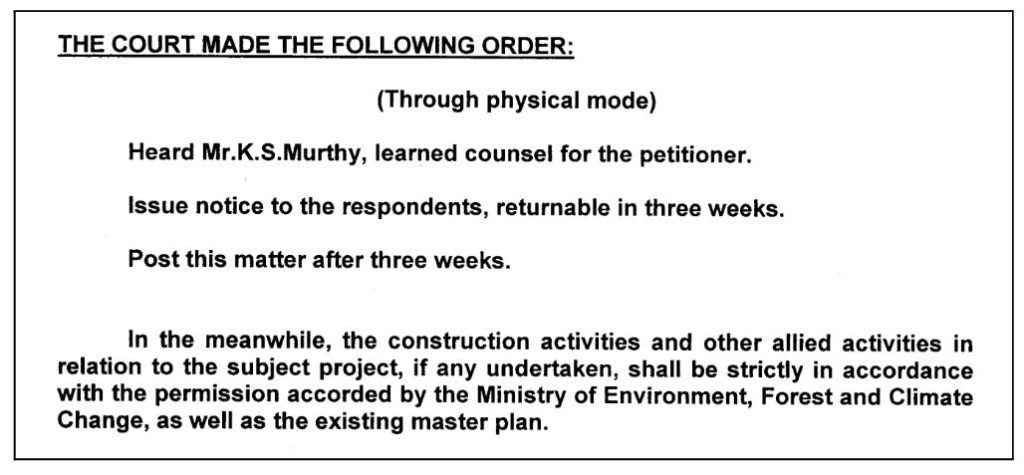
The respondent of the present case addressed a letter to NGT on 31 October 2021, on the same issue. The NGT appointed a four-member expert committee on 17 December 2021, which submitted its report on 29 March 2022. The committee observed no violations in the ongoing construction activities. The NGT again appointed a second expert committee, whose report is still awaited. Even in the absence of such a report, the NGT ordered that no further construction shall take place in its order of 06 May 2022.
The apex court held that it was not appropriate on part of NGT to continue the proceedings when the same matter is being pending in the High Court. It highlighted the confusion arising out of the conflicting orders by both agencies.
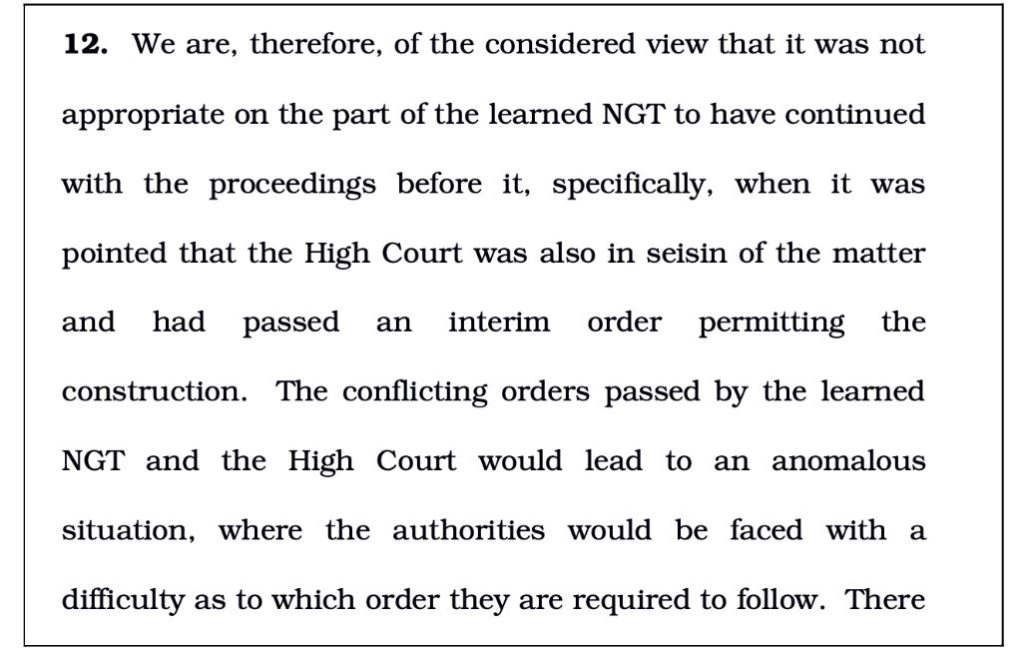
The apex court further observed that orders by the constitutional court prevail over the statutory tribunals and proceedings of the same issue before different agencies would not be in the interest of Justice. Accordingly, the proceedings before NGT are quashed and the respondents are advised to approach the High Court for appropriate orders.
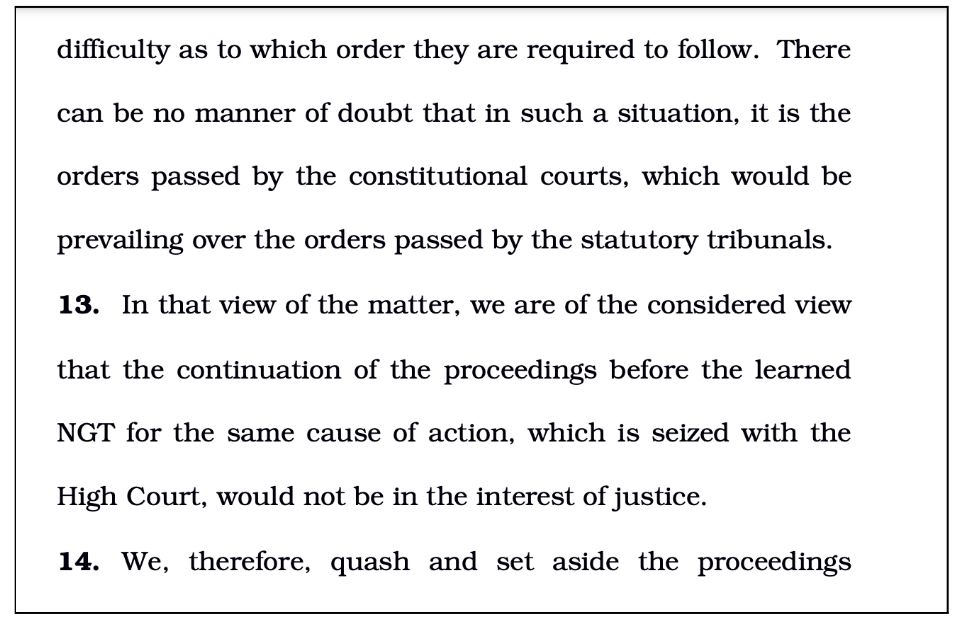
Delhi HC: Right to claim maintenance under Sec. 125 CrPC and Domestic Violence Act, 2005 are not mutually exclusive
The Delhi High Court, in SH Jagmohan Kashyap vs. Government of NCT of Delhi & ANR, held that the right to claim maintenance under the Section 125 of Code of Criminal Procedure,1973 (Cr.P.C), and The Protection of Women from Domestic Violence Act, 2005, are not mutually exclusive, and the amount of maintenance awarded by one court will be considered by another court when deciding upon the maintenance.
The petitioner and his wife were having multiple lawsuits between them under a different set of laws. The initial petition seeking for the interim maintenance under the Domestic Violence Act, of 2005 was dismissed in 2014. The appeal was filed after a delay of three years, but the Additional Sessions Judge (ASJ) held that there were sufficient reasons for this delay and allowed for the condonation of the delay subject to a cost of Rs. 8,000, under Section 5 of the Indian Limitation Act, 1963. The High Court was hearing an appeal petition against the order of the ASJ passed on 30 January 2020.
The High Court held that a major confusion arose because of the multiple avenues for relief sought. It held that an adequate balance must be struck between different provisions of competing acts.
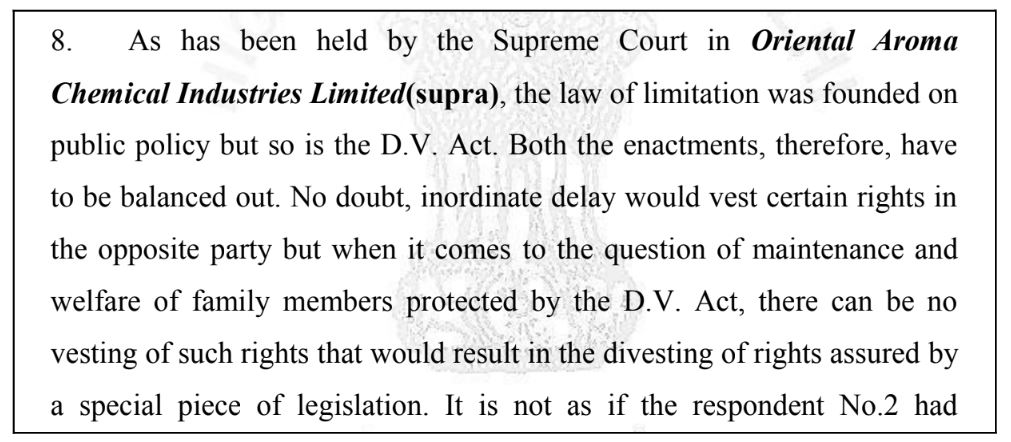
Additionally, it also held that Section 5 of the Limitation Act, 1963 is elastic enough to accommodate sufficient and reasonable causes for delay. It also held that ASJ was right in not dismissing the appeal on the ground of procedural technicalities. It also held that the right to seek maintenance under the domestic violence act, and under section 125 of the Cr.P.C. are not mutually exclusive.

Karnataka HC: Compounding and termination of proceedings for rape offences can be done if settlement is arrived at by the parties.
In the case of Satish K vs. The State of Karnataka, the Karnataka High Court held that criminal proceedings can be terminated even for the offences punishable under Section 376 of the Indian Penal Code, 1860 if the aggrieved parties arrive at a settlement.
The Court was hearing a petition filed by the petitioner urging to quash criminal proceedings registered under Section 376, as the complainants and the petitioner have mediated and arrived at a settlement in the form of an affidavit before this court. The petitioners relied on Section 483 of the Cr.P.C to be read with Section 320, to make these alleged offences compoundable. This was objected to by the Government Counsel as the offence is under Section 376 of the IPC.
The court relied on the judgements of the Supreme Court, and other High Courts to decide this case. In Prashant Bhartiya vs. State of Delhi, the apex court took the view that criminal proceedings under Section 376 of IPC can be quashed keeping in mind the mediation between the parties, along with the submission on behalf of complainants. The same stand was observed in K Dhandapani vs. The State by the Inspector of Police, wherein the court observed that it cannot shun its eyes to ground reality and disturb the happy family.
Similarly, the High Court of Karnataka, in V. Prabhu vs. State of Karnataka and another, and H.S. Chandan vs. State of Karnataka and another, held the same view as the Supreme Court, and allowed for the compounding of the offences under Section 376 of the IPC and quashed proceedings in cases of settlements.
Upon going through the above judgements, Justice M. Nagaprasanna’s bench of the Karnataka High Court held that it is proper to allow the application requesting the compounding of offences and termination of the proceedings.
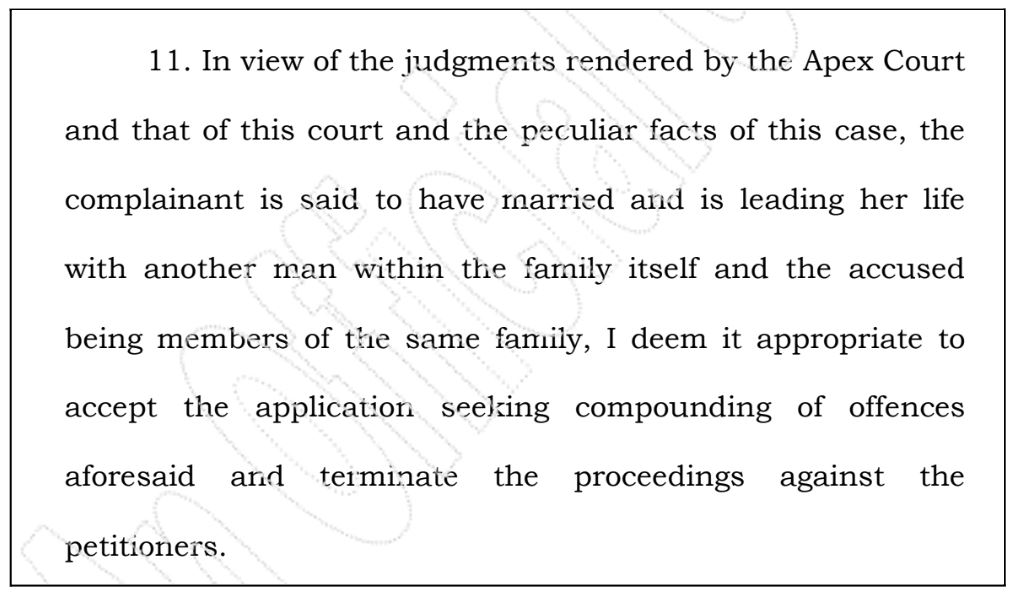
Featured Image: Important Court Judgments


